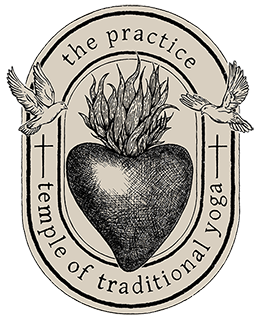by Ellen Arthur.
Why do we practice? What keeps us coming back? The reason we practice anything, whether its yoga, a language, a sport, is so that our knowledge of that thing deepens. Our thirst for understanding propels our desire to practice.
These questions were never something I considered when I first met the mat. It wasn’t so much of a conscious decision to return to practice as it was a deep visceral desire to feel good and to evolve. To feel that through practice I was able to connect to something beyond the bazaar world my mind usually dwelled in. The mind (my mind, your mind) is a tool. We can use it to enhance the way we view the world (Worldview – Santali) or we can use it to destroy and destruct. For a long time I didn’t know I had a choice, I just resigned myself to the fact that I was going to be at the mercy of the mind forever!!
It is an assumption to say, but for the most part, we practice firstly for ourselves. To make ourselves feel more energetically rich, strong, healthy and attuned to the environment around us, making us more connected and conscious of our actions. In order to progress along any path, this step is essential. To feel good within our own skin, to find love for ourselves first.

Then something magical happens. The lens of our practice starts to shift. We begin to realise that by healing ourselves we inadvertently begin to heal those around us. Our devotion, our discipline, our capacity to feel and engaged from a deeper pool of emotions has a ripple affect. After all… isn’t that why we are here? To be of service to each other and therefore to be of service to the world?
In Yoga we have a word that embodies this concept. This word in Sanskrit is Seva; having an interest in the well-being of others as well as oneself. Service gives us the opportunity to lose the concept of “self” that we have programmed/created so that we can offer our time selflessly to others.
Serving others is considered a great siddhi, a great power. In order to serve others we must confront very real and impressionable thoughts and ideas that we have about ourselves and the world. Service asks us to renounce our own selfish desires and needs. This can be quite a hurdle to overcome. Through the practice of Seva we are able to see quite clearly where our patterns and conditions arise from. Ultimately the things that we unconsciously repeat, whether they are thoughts, actions or addictions, are the very things that keep us stuck and habitual.
Karma Yoga, meaning deed or action, refers to the law of cause and effect. The idea is that every action leads to a reasonable result – and that everything that happens can be traced back to something done in the past. Actions determine destiny, this is the basis of Karma Yoga. We reap what we sow.
In the Bhagavad Gita, Krishna says that we must work not for our own sake but for the welfare of all. Pointing out that this is the basic law underlying all of creation. That each being must do their part in the grand scheme of life.
Krishna tells Arjuna, “we must perform our duties without attachment to their fruit or outcome. We must act in a selfless spirit, without ego-involvement and without getting entangled in whether things work out the way we want; only then will we not fall into the terrible net of Karma”.
Arjuna asks Krishna, what powers bind us to our selfish ways? Even when we want to act rightly, often we do the wrong thing. What power moves us?
Krishna replies… “Anger and selfish desire are our greatest enemies. They are the destructive powers that can compel us to wander away from our purpose, to end up in self delusion and despair”.
So as you can see, this is not an easy task to undertake when we are confronted by our biggest hurdles and demons in the process of serving others. This is why our practice and what we practice is so essential. Practices that amplify our demons, struggles and our ego will obviously take us further and further down the path of self destruction. Whereas practices that soften us, humble us, connect us to our hearts and challenge us mentally give us strength to walk the path of purpose, the path of Dharma.
To be of service is to ask the questions… When I do something, why do I expect something in return? Why do I think the world owes me? What am I trying to gain by giving to others? What am I trying to fulfil or suppress?
Practice brings self inquiry, and through this we are able to ask the harder, deeper questions. Our capacity to look at our darkness, our greed, without judgement or reaction based on habit, is what allows us to progress and overcome selfish tendencies.
When was the last time you really considered the impact your practice is having on you and the world around you? When was the last time you did something without attachment to individual gain? What would that look like for you? How would that feel? I encourage you to use the science of yoga as a way to deeply connect with your truest nature so that in turn you are able to share and be of service to the world and those around you.
I will leave you with this from Krishna…
“Fulfil all your duties; action is better than inaction. Even to maintain your body Arjuna you are obliged to act. Selfish action imprisons the world. Act selflessly without any thought of personal gain”.
Many blessings to you,
Namaste,
Elle
